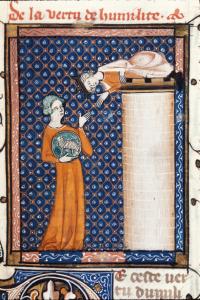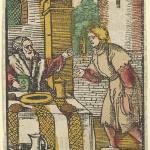
We have been warned, many times, not to let pride get the best of us, for it often makes us think we are capable of doing things which we really can’t do. “Pride goes before destruction, and a haughty spirit before a fall” (Prov. 16:18 RSV). Thus, for example, just because someone only drives in a sparsely populated area, in the middle of the night, and does not get into an accident, this does not mean they are a good driver, which is why they shouldn’t brag to others as if they were. For, it is clear, if they drove in the middle of a big city during rush hour, they would discover more about themselves and their driving capabilities, and that driving can be and is much more difficult than the kind of driving they are used to doing. Similarly, then, we should understand, if we are not facing various temptations, because we do not find ourselves in those circumstances in which such temptations emerge, we should not think we are beyond them. We really have not been tried by them, Sadly, we tend to think the opposite, and believe, if we are not dealing with or encountered a temptation, it is because it is beneath us. Sometimes, this makes us boast, comparing ourselves to others, saying we think we are superior to them because we don’t find ourselves tempted in they are. Similarly, even if we have found a way to resist a temptation, this does not mean we have transcended the passions upon which the temptation itself thrives upon, that we don’t have, deep within us, some of the same desires as those who fall for it. Indeed, for something to tempt us, we must have within us some desire to do what the temptation suggests, and so, just because we do not fall for it, we must not think we are superior to, or beyond the scope of, that temptation. One of the saying associated with Abba Abraham makes this point well (with an example which comes from and is relevant to the monastic context in which he spoke):
It was said of an old man that for fifty years he had neither eaten bread nor drunk wine readily. He even said, ‘I have destroyed fornication, avarice, and vain-glory in myself.’ Learning that he had said this, Abba Abraham came and said to him, ‘Did you really say that?’ He answered, ‘Yes.’ Then Abba Abraham said to him, ‘If you were to find a woman lying on your mat when you entered your cell would you think that it is not a woman?’ ‘No,’ he replied, ‘But I should struggle against my thoughts so as not to touch her.’ Then Abba Abraham said, ‘Then you have not destroyed the passion, but it still lives in you although it is controlled. Again, if you are walking along and you see some gold amongst the stones and shells, can your spirit regard them all as equal value?’ ‘No,’ he replied, ‘But I would struggle against my thoughts so as not to take the gold.’ The old man said to him, ‘See, avarice still lives in you, though it is controlled.’ Abba Abraham continued, ‘Suppose you learn that of two brothers one loves you and the other hates you, and speaks evil of you; if they come to see you, will you receive them both with the same love?’ ‘No,’ he said, ‘But I should struggle against my thoughts so as to be kind towards the one who hates me as towards the one who loves me.’ Abba Abraham said, ‘So then, the passions continue to live; it is simply that they are controlled by the saints.’[1]
Pride can make us think we are beyond temptation, either because we do not experience it due to the circumstances we are in, or because we have built up some resistance to it and so not fall for its suggestion at a given time. In either situation, we must not assume we are something which we are not. We must not assume we have become superior just because we have avoided some inordinate passion in our lives. Again, it is important for us to realize the fact that we are tempted to do something shows we have much in common with those who experience the temptation and fall for it. If we are not careful, we might find our resistance faltering, until at last, our pride has cut us off from all our defenses and we fall for it ourselves. “When pride comes, then comes disgrace; but with the humble is wisdom” (Prov. 11:2 RSV). This, likewise, is why we should not look down upon others who face the same temptations we face, but who are, for one reason or another, unable to resist them. If we are not careful, not only will we eventually find our pride gets the best of us, when we do, we will often find that all we have done was repress desires in such a way that when we falter and embrace a particular temptation, we will do so with great intensity, surpassing those whom we previously ridiculed. Indeed, we will be worse off, because we not only have fallen for the temptation we thought we had overcome, we willingly accepted and embraced other temptations, such as pride, turning us away from the humility which we should have. This shows us the validity of Paul’s warning: “For if any one thinks he is something, when he is nothing, he deceives himself” (Gal. 6:3 RSV). Our pride come from self-deception, and so long as we embrace it, we only prepare ourselves for our own ruin. We should seek humility, not to tax ourselves in trying to do more than we can, which also, was a point which Abba Abraham made to a another monk:
Abba Abraham told of a man of Scetis who was a scribe and did not eat bread. A brother came to him to copy a book. The old man whose spirit was engaged in contemplation, wrote, omitting some phrases and with no punctuation. The brother, taking the book and wishing to punctuate it, noticed that words were missing. So he said to the old man, ‘Abba, there are some phrases missing.’ The old man said to him, ‘Go, and practise first that which is written, then come back and I will write the rest.’ [2]
We should not engage tasks which are too difficult for ourselves to do. We should take things slowly, and when we are ready, we will understand what we need to do next. Pride makes us think we are ready when we are not, that we are better, more capable than we are, and so encourages us to do things which are not yet meant for us. If we give in to what our pride suggests, we will discover the truth for ourselves, as we find ourselves failing miserably to do those things we claimed we could do. Hopefully, if that happens, we will then be set free, that the self-deception which pride gave to us will be overcome, allowing us to embrace humility and the modesty which it suggests. Otherwise, we risk falling into despair, thinking we will never be capable of doing what is expected for us. We need to realize that just because we are not ready for some activity today does not mean we will not be ready tomorrow, but to get there, we must be humble and patient, slowly building ourselves up so that we can and will be able to do what is expected of us when the time is right.
[1] The Sayings of the Desert Fathers. trans. Benedicta Ward (Kalamazoo, MI: Cistercian Publications, 1984), 33-4 [Saying of Abba Abraham #1].
[2] The Sayings of the Desert Fathers, 34 [Saying of Abba Abraham #3].
Stay in touch! Like A Little Bit of Nothing on Facebook.
If you liked what you read, please consider sharing it with your friends and family!













